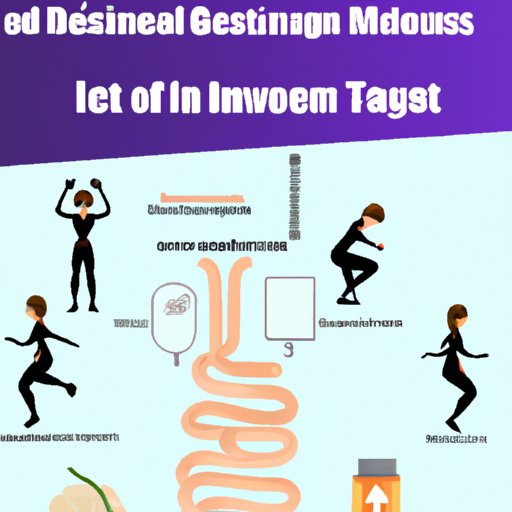Introduction
Have you ever noticed that after a good workout, you tend to need to go to the bathroom soon afterwards? This phenomenon is known as post-exercise pooping, and it can be both an inconvenience and a benefit to your overall health. In this article, we’ll explore why you poop after working out and how it can help your digestive system.

How Working Out Can Help Your Digestive System
When you exercise, your body experiences a number of physiological changes that can affect your digestive system. Exercise increases your metabolic rate, which is the rate at which your body breaks down food into energy. This means that your body is able to process food more quickly, resulting in improved digestion. Additionally, when you exercise, your blood flow increases, allowing more oxygen and nutrients to reach your intestines. This can help improve the health of your digestive tract, leading to better digestion and elimination.
Regular exercise also helps to build muscle mass, which can help to support your digestive organs. Stronger muscles mean that your organs are better able to move food through your digestive tract, leading to improved digestion and elimination. All of these benefits can help to keep your digestive system running smoothly.
Exploring the Link Between Exercise and Pooping
The link between exercise and pooping is largely due to the role of intestinal motility. Intestinal motility is the movement of food through your intestines. When you exercise, your body releases hormones that can increase the motility of your intestines. This means that food is moved through your digestive tract more quickly, resulting in quicker elimination.
There are several other factors that can contribute to post-exercise pooping. For example, if you have recently changed your diet or have been eating more fiber, your body may need to adjust to the new foods. Additionally, dehydration can also cause you to experience post-exercise pooping. Finally, stress can also play a role in your post-exercise bowel movements.

Understanding Why You Poop After Working Out
Diet and nutrition are important factors when it comes to post-exercise pooping. If you’ve recently changed your diet, your body may need time to adjust to the new foods. Eating a balanced diet that includes plenty of fiber can help to keep your digestive system running smoothly. Additionally, drinking plenty of water and avoiding sugary drinks can help to prevent dehydration, which can lead to post-exercise pooping.
Stress can also play a role in post-exercise pooping. If you’re feeling stressed or anxious, your body may respond by releasing hormones that can increase the motility of your intestines, resulting in a need to poop. Taking time to relax and reducing stress can help to prevent post-exercise pooping.
Examining the Role of Intestinal Motility in Post-Exercise Bowel Movements
Exercise can have a direct effect on your intestinal motility. When you exercise, your body releases hormones that can increase the motility of your intestines, resulting in quicker elimination. Additionally, exercise can also stimulate the release of hormones that can slow down your intestinal motility, which can help to prevent diarrhea.
The hormones involved in post-exercise pooping can also play a role in regulating your appetite. These hormones can decrease hunger and increase feelings of fullness, which can help you stay on track with your diet and weight loss goals.
Conclusion
Post-exercise pooping can be both an inconvenience and a benefit to your overall health. Working out can help to improve your digestion and elimination, and can even help to regulate your appetite. Understanding the role of intestinal motility in post-exercise pooping can help you to better understand why you poop after working out. To avoid post-exercise pooping, make sure to drink plenty of water, eat a balanced diet, and reduce stress.
(Note: Is this article not meeting your expectations? Do you have knowledge or insights to share? Unlock new opportunities and expand your reach by joining our authors team. Click Registration to join us and share your expertise with our readers.)
